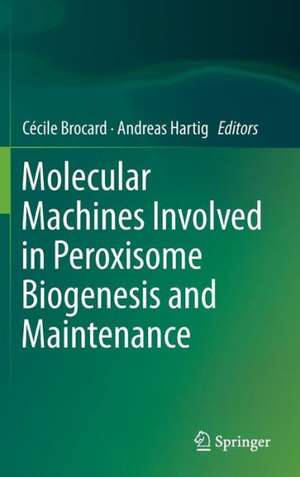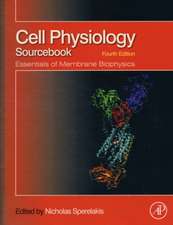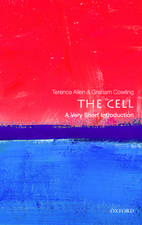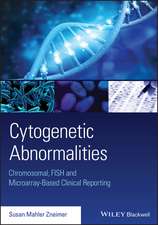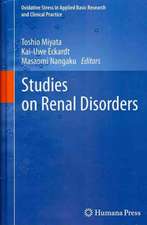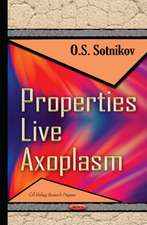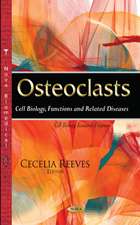Molecular Machines Involved in Peroxisome Biogenesis and Maintenance
Editat de Cecile Brocard, Andreas Hartigen Limba Engleză Hardback – 11 aug 2014
| Toate formatele și edițiile | Preț | Express |
|---|---|---|
| Paperback (1) | 956.99 lei 6-8 săpt. | |
| SPRINGER VIENNA – 16 sep 2016 | 956.99 lei 6-8 săpt. | |
| Hardback (1) | 963.15 lei 6-8 săpt. | |
| SPRINGER VIENNA – 11 aug 2014 | 963.15 lei 6-8 săpt. |
Preț: 963.15 lei
Preț vechi: 1174.58 lei
-18% Nou
Puncte Express: 1445
Preț estimativ în valută:
184.29€ • 192.42$ • 152.53£
184.29€ • 192.42$ • 152.53£
Carte tipărită la comandă
Livrare economică 04-18 aprilie
Preluare comenzi: 021 569.72.76
Specificații
ISBN-13: 9783709117873
ISBN-10: 3709117879
Pagini: 558
Ilustrații: XV, 543 p. 51 illus., 34 illus. in color.
Dimensiuni: 155 x 235 x 30 mm
Greutate: 0.95 kg
Ediția:2014
Editura: SPRINGER VIENNA
Colecția Springer
Locul publicării:Vienna, Austria
ISBN-10: 3709117879
Pagini: 558
Ilustrații: XV, 543 p. 51 illus., 34 illus. in color.
Dimensiuni: 155 x 235 x 30 mm
Greutate: 0.95 kg
Ediția:2014
Editura: SPRINGER VIENNA
Colecția Springer
Locul publicării:Vienna, Austria
Public țintă
ResearchCuprins
Peroxisome biogenesis and function: History and Discovery of peroxins.- Human cell lines to study peroxisome biogenesis.- Mouse models to study peroxisome biogenesis.- Metabolic interaction between peroxisome and Mitochondria.- Peroxisomal Diseases:The Zellweger spectrum.- Molecular basis.- PEX11beta.- Peroxisome morphology in pathologies.- Other peroxisome-related disorders.- New technologies applied to study peroxisomes: Bioinformatics.- Imaging in plant and peroxules.- Tools to study peroxisomes as signaling platform: oxidative stress studies and antiviral innate immunity.- Proteomic approach. Protein transport across the peroxisomal membrane: The matrix protein import complex in yeast.- Protein transport in plant peroxisomes.- Concept Exportomer.- Factors involved in ubiquitination/deubiquitination of PEX5.- Peroxisome dynamics: Trafficking of the peroxisome biogenesis factor PEX3 through the ER.- Role of PEX3 and PEX19 in peroxisome membrane biogenesis.- Vesicles, reticulon and ER-to-peroxisome contact sites.- Pex11 proteins and their alpha-helix.- Molecular complex coordinating peroxisome morphogenesis.- Dynamin-related proteins. Specific degradation through pexophagy: Principle of selective organelle degradation: Factors involved in pexophagy in the yeast Pichia pastoris.
Notă biografică
Cecile Brocard received her PhD in Biochemistry at the University of Vienna, Austria in 1998. She was CIHR post Doctoral fellow at the University of Western Ontario, Medical Sciences, Canada and at the University of Vienna, Austria, where she also was a Guest Professor from 2006 to 2007. In 2007 she became independent research group leader and Elisa Richter Fellow at the Max-F. Perutz Laboratories in Vienna. Since 2012 Cecile has been Head of research in the start up company Tissue Med Biosciences, in Krems an der Donau, Austria.
Andreas Hartig has a PhD in Biochemistry. He was Fogarty Fellow in the Laboratory of Molecular Biology, NINCDS, NIH, Bethesda, USA and Postdoctoral fellow at the Waksman Institute of Microbiology, Rutgers University, in New Jersey and at the Department of Genetics, University of Washington, Seattle, USA. He was research Assistant at the Institute of Biochemistry, University of Vienna, Austria and became Associate Professor in Biochemistry in 1993 where he still works today.
Andreas Hartig has a PhD in Biochemistry. He was Fogarty Fellow in the Laboratory of Molecular Biology, NINCDS, NIH, Bethesda, USA and Postdoctoral fellow at the Waksman Institute of Microbiology, Rutgers University, in New Jersey and at the Department of Genetics, University of Washington, Seattle, USA. He was research Assistant at the Institute of Biochemistry, University of Vienna, Austria and became Associate Professor in Biochemistry in 1993 where he still works today.
Textul de pe ultima copertă
In eukaryotes, lipid metabolism requires the function of peroxisomes. These multitasking organelles are also part of species-specific pathways such as the glyoxylate cycle in yeast and plants or the synthesis of ether lipid in mammals. Proteins required for the biogenesis of peroxisomes typically assemble in large molecular complexes, which participate in membrane formation, protein transport, peroxisome duplication and - inheritance during cell division. Peroxisomal function is essential for life. Mutations in PEX genes, encoding for biogenesis factors, are often associated with lethal disorders. The association of peroxisomes with other organelles suggests an extensive participation in organellar crosstalk. This book represents a state-of-the-art review in the field of peroxisome research encompassing the cell and molecular biology of peroxisome biogenesis and its diseases, the protein complexes involved in this process and the modern technologies applied to study them. The book is intended for graduate students, researchers and lecturers in biochemistry, molecular and cell biology with a biomedical background.
Caracteristici
Provides a comprehensive, well structured state-of-the-art overview on various aspects of peroxisomes cell biology and research
A separate part is dedicated to modern technologies such as bioinformatics, proteomics and imaging tools
Model organisms to study peroxisome biogenesis ranging from plants to mammals are presented
The molecular basis of main peroxisome related disorders are described
Includes supplementary material: sn.pub/extras
A separate part is dedicated to modern technologies such as bioinformatics, proteomics and imaging tools
Model organisms to study peroxisome biogenesis ranging from plants to mammals are presented
The molecular basis of main peroxisome related disorders are described
Includes supplementary material: sn.pub/extras
